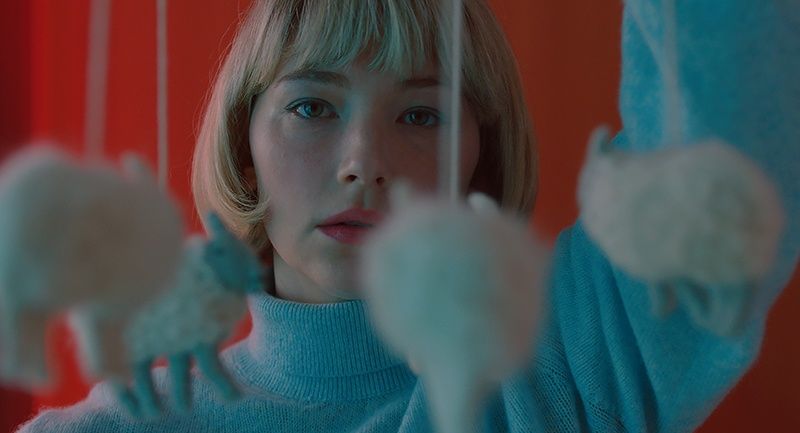Create a free profile to get unlimited access to exclusive videos, sweepstakes, and more!
Carlo Mirabella-Davis on the feminist horror of Swallow

The horrors of womanhood have been explored in various veins. The terror of a girl's sexual awakening has flourished in Jennifer's Body, Teeth, Ginger Snaps, and Raw. The fear of motherhood has fueled films like The Bad Seed, Prevenge, XX, and Alien. The horrors of domesticity played at the heart of The Stepford Wives, Vivarium, Greener Grass, and now Swallow, which follows an unhappy homemaker's stomach-churning quest for self-discovery through self-destruction.
Following its world premiere at the Tribeca Film Festival, buzz brewed about this delectable horror-thriller when it caused an audience member to pass out. When SYFY FANGRRLS caught up with Swallow at its Texas premiere at Fantastic Fest, we were knocked out too, not only by its unique brand of horror but also its outstanding understanding of a woman struggling to break free of the suffocating expectations of a patriarchy that demands to define her. So we sought out Swallow's writer/director Carlo Mirabella-Davis to discuss the film's feminist themes and their real-life inspirations.
Swallow stars Haley Bennett as Hunter, a young housewife who feels pressured by her husband, his parents, and his friends to be endlessly pleasant, polished, and happy. She strives to be his ideal wife, whether presenting appetizers at a party, vacuuming her home, or dressing for dinner. But once Hunter gets pregnant, the increasing pressures of perfection push her to pica, an eating disorder which involves eating inedible objects. In Hunter's case, she swallows a marble, a thumbtack, an AA battery, and more in an attempt to grab back some control over her life and body.
Through this framing, Hunter's swallowing comes off as more than a sign of mental illness, but also as a form of reckless revolt. "I liked the idea that in a way Hunter's compulsion becomes this quiet rebellion that grows like a pebble in an avalanche," Mirabella-Davis said of developing Hunter's arc and the film's political subtext. "That — even though it is dangerous — allows her to find what she really wants, her true self, and rebel from this patriarchal system."
Hunter's story of struggle and rebellion was inspired by Mirabella-Davis' grandmother. Her deep dissatisfaction with being a 1950s housewife fed into debilitating rituals of control that led to her being committed to a mental intuition. To get out, his grandmother not only had to show improvement but also make a shockingly sexist assurance to her doctors. "In order for her to leave, they made her swear that she would uphold the duties of a wife," Mirabella-Davis explained. "That she would maintain the household, that she would have a social life. She had to swear that she would do all those things in order to be let out of the hospital." He continued, "It was the experience with my grandmother that opened my eyes to how insidious sexism can be, how it's so baked into the cake."
Mirabella-Davis, who identifies as male, has experienced his own brushes with the oppression of the patriarchy. He shared, "When I was in my 20s, I began to identify as a woman and I transitioned for a period. I had a different name and I wore women's clothing. That was a wonderful and really important time in my life. And it allowed me to also see the way that the world views female-identified people, and the way that the patriarchy seeks to control, maintain, repress. Certainly, just the experience of walking down the street is something that was interesting."
Between his experiences and his grandmother's, Mirabella-Davis sought to make his narrative feature debut with a film that would speak to both. "I really wanted to make a feminist film," he explains, "but I was worried at the time about my male gaze and growing up as a man. I wanted it to feel honest and authentic."
Aware that he might have blind spots about the female experience, Mirabella-Davis sought out the help of women. His crew was two-thirds female-identifying artists, including producer Molly Asher, cinematographer Katelin Arizmendi, production designer Erin Magill, and costume designer Liene Dobraja. "I was very honored that they made the story of my grandmother their own," he said. "The film benefited so much from their pouring their hearts and souls into it."
Together, Mirabella-Davis and his crew sought to make a film that would speak not only to women but also to men who might not be as aware of the horrors of patriarchal pressure. "It's like, you can go through the day not thinking about sexism if you're a man," he mused. "You don't have to. You can choose to think about it or not think about it. That itself is a privilege. Whereas if you're a female-identified person, it's like you have to think about it all the time because it's everywhere."
Of course, the patriarchy isn't just oppressive to women. Its gender norms can feel confining to men too. Mirabella-Davis has empathy for all those suffering under this weight. "I think gender expectations for our society are always hanging over us. Whether you identify as a man, identify as a woman, or not, that idea of what society feels you should be is always there, and so we're always wrestling it."
As we wrapped up, I asked if he had any final thoughts on Swallow that he'd like to share. Mirabella-Davis considered for a moment, then said, "As a country, I hope we're ready to empathize with each other more and to fight back against a repressive and oppressive system. I hope that in some small way my movie helps people feel seen and increases empathy."
IFC Films plans to release Swallow in 2020.














